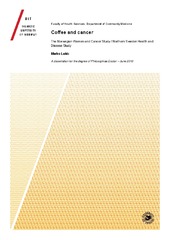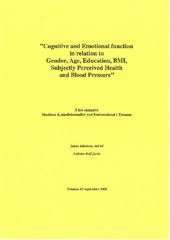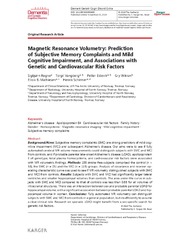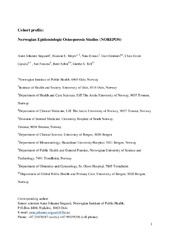Blar i tittel Det helsevitenskapelige fakultet
Viser treff 1527-1546 av 10152
-
Coffee and cancer
(Doctoral thesis; Doktorgradsavhandling, 2018-10-12)<p>You cannot imagine powering through the day without your favorite beverage being on your desk all the time. Have you ever wondered what the consequences might be? </p> <p>It seems that even before you have opened your eyes, there’s already a kettle on the stove or the coffee machine is purring. On the way to work, you have another cup to go from the nearby coffee chop. Long meetings demand ... -
Coffee and tea consumption and risk of pre- and postmenopausal breast cancer in the European Prospective Investigation into Cancer and Nutrition (EPIC) cohort study
(Journal article; Tidsskriftartikkel; Peer reviewed, 2015-01-31)Introduction: Specific coffee subtypes and tea may impact risk of pre- and post-menopausal breast cancer differently. We investigated the association between coffee (total, caffeinated, decaffeinated) and tea intake and risk of breast cancer.<p> <p>Methods: A total of 335,060 women participating in the European Prospective Investigation into Nutrition and Cancer (EPIC) Study, completed a dietary ... -
Coffee and tea consumption and the contribution of their added ingredients to total energy and nutrient intakes in 10 European countries: Benchmark data from the late 1990s
(Journal article; Tidsskriftartikkel; Peer reviewed, 2018-06-05)Background: <br>Coffee and tea are among the most commonly consumed nonalcoholic beverages worldwide, but methodological differences in assessing intake often hamper comparisons across populations. We aimed to (i) describe coffee and tea intakes and (ii) assess their contribution to intakes of selected nutrients in adults across 10 European countries. <br>Method: <br>Between 1995 and 2000, ... -
Coffee as a risk factor for cardiovascular diseases. A literature study
(Master thesis; Mastergradsoppgave, 2016-07-28)Coffee is the most widely drunk beverage around the world, especially within Scandinavia.However, there have been conflicting evidence on the consumption of coffee as a risk factor for cardiovascular diseases. The importance to explore the full effects of coffee related health problems, including brewing methods, is mainly due to the high consumption rate of coffee around the world. In the context ... -
Coffee consumption and overall and cause-specific mortality: the Norwegian Women and Cancer Study (NOWAC)
(Journal article; Tidsskriftartikkel; Peer reviewed, 2020-07-23)Coffee consumption has previously been reported to reduce overall and cause-specific mortality. We aimed to further investigate this association by coffee brewing methods and in a population with heavy coffee consumers. The information on total, filtered, instant, and boiled coffee consumption from self-administered questionnaires was available from 117,228 women in the Norwegian Women and Cancer ... -
Coffee consumption and risk of first and recurrent venous thromboembolism (VTE) and all-cause mortality after VTE
(Master thesis; Mastergradsoppgave, 2017-05-15)Coffee is one of the most consumed beverages in the world and it has been reported to be associated with the risk of cardiovascular disease. Venous Thromboembolism (VTE) is a major public health burden, although its association to dietary habits including coffee consumption is still underinvestigated. The aim of this thesis was to investigate the association between daily coffee intake and the risk ... -
Coffee consumption and risk of rare cancers in Scandinavian countries
(Journal article; Tidsskriftartikkel; Peer reviewed, 2018-02-23)Studies on the association between heavy coffee consumption and risk of less frequently diagnosed cancers are scarce. We aimed to quantify the association between filtered, boiled, and total coffee consumption and the risk of bladder, esophageal, kidney, pancreatic, and stomach cancers. We used data from the Norwegian Women and Cancer Study and the Northern Sweden Health and Disease Study. Information ... -
Coffee consumption and the risk of cancer in the Norwegian Women and Cancer (NOWAC) study
(Journal article; Tidsskriftartikkel; Peer reviewed, 2016-03-24)An association between coffee consumption and cancer has long been investigated. Coffee consumption among Norwegian women is high, thus this is a favorable population in which to study the impact of coffee on cancer incidence. Information on coffee consumption was collected from 91,767 women at baseline in the Norwegian Women and Cancer Study. These information were applied until follow-up information ... -
Coffee consumption and the risk of malignant melanoma in the Norwegian Women and Cancer (NOWAC) Study
(Journal article; Tidsskriftartikkel; Peer reviewed, 2016-07-29)Background: Coffee contains biologically-active substances that suppress carcinogenesis in vivo, and coffee consumption has been associated with a lower risk of malignant melanoma. We studied the impact of total coffee consumption and of different brewing methods on the incidence of malignant melanoma in a prospective cohort of Norwegian women. <p>Methods: We had baseline information on total ... -
Coffee consumption and the risk of Venous Thromboembolism – The Tromsø study
(Master thesis; Mastergradsoppgave, 2011-11-01)Background: Several studies have investigated the association between coffee consumption and cardiovascular disease, but little is known about coffee intake and risk of venous thromboembolism (VTE). Objective: The aim of this prospective cohort study was to investigate the association between coffee consumption and risk of incident VTE in a general population. Methods: Information about coffee ... -
Coffee Consumption and Whole-Blood Gene Expression in the Norwegian Women and Cancer Post-Genome Cohort
(Journal article; Tidsskriftartikkel; Peer reviewed, 2018-08-09)Norwegians are the second highest consumers of coffee in the world. Lately, several studies have suggested that beneficial health effects are associated with coffee consumption. By analyzing whole-blood derived, microarray based mRNA gene expression data from 958 cancer-free women from the Norwegian Women and Cancer Post-Genome Cohort, we assessed the potential associations between coffee consumption ... -
Coffee, tea and melanoma risk: findings from the European Prospective Investigation into Cancer and Nutrition
(Journal article; Tidsskriftartikkel; Peer reviewed, 2017-02-20)In vitro and animal studies suggest that bioactive constituents of coffee and tea may have anticarcinogenic effects against cutaneous melanoma; however, epidemiological evidence is limited to date. We examined the relationships between coffee (total, caffeinated or decaffeinated) and tea consumption and risk of melanoma in the European Prospective Investigation into Cancer and Nutrition (EPIC). EPIC ... -
Cognition and nutritional status. Relationship between cognitive function and nutritional status in community-living elderly men and women
(Master thesis; Mastergradsoppgave, 2014-05-28)Background: Elderly persons are at increased risk of both malnutrition and cognitive impairment. The purpose of this study is to investigate the relationship between nutritional status and cognitive function in elderly persons living at home. Methods: This population based cross-sectional study included 863 women and 594 men aged 65 years and older. Cognitive performance was measured by use of the ... -
Cognitive and emotional function in relation to gender, age, education, BMI, subjectly perceived health and blood pressure
(Master thesis; Mastergradsoppgave, 2006-09-15) -
Cognitive function and mild cognitive impairment in a general population: roles of cardiovascular and genetic risk factors and magnetic resonance volumetry. The Tromsø Study
(Doctoral thesis; Doktorgradsavhandling, 2018-12-14)Alzheimers sykdom er den vanligste årsaken til demens, dernest karsykdom som forårsaker vaskulær demens. De fleste som får Alzheimers demens etter 65 års alder (late onset Alzheimer’s Disease, LOAD), har ikke sykdommen i familien fra tidligere. Men opptil 25 % av dem som får LOAD, har biologiske slektninger med LOAD. Personer i familier med opphopning av LOAD, har økt risiko for å få LOAD. Det er ... -
Cognitive function in mild to moderately depressed and previously depressed individuals
(Master thesis; Mastergradsoppgave, 2009-05-04)The present study explored differences between groups of Never Depressed (ND, n = 50), Previously Depressed (PD, n = 81) and Clinically Depressed (CD, n = 38) individuals with mild to moderate depression severity on tests of executive functions, working memory, memory, attention, and psychomotor speed and information processing. The most striking finding was the absence of significant differences ... -
Cognitive impairment in older cancer patients treated with first-line chemotherapy
(Journal article; Tidsskriftartikkel; Peer reviewed, 2021-12-07)Older cancer patients are vulnerable to chemotherapy-related cognitive impairment. We prospectively evaluated cognitive impairment and its predictive factors during first-line chemotherapy in elderly cancer patients (≥70 years). Cognitive function was evaluated by the Mini-Mental State Examination (MMSE) with adjusted scores for age and sociocultural level. Multidimensional geriatric assessment was ... -
Cohesive collisions of particles in liquid media studied by CFD-DEM, video tracking, and Positron Emission Particle Tracking
(Journal article; Tidsskriftartikkel; Peer reviewed, 2023-05-18)This paper investigates the cohesive collision of ice in an oil phase at temperatures ranging from −15.7 °C to −0.3 °C. The new information on the coefficient of restitution (COR) was obtained using three different velocity measurement methods: high-speed experimental video recording, Positron Emission Particle Tracking (PEPT), and numerical simulations. A new type of PEPT tracer was developed for ... -
Cohort Profile : Cohort of Norway (CONOR)
(Journal article; Tidsskriftartikkel; Peer reviewed, 2008) -
Cohort profile: Norwegian Epidemiologic Osteoporosis Studies (NOREPOS)
(Journal article; Tidsskriftartikkel; Peer reviewed, 2014-10-02)Aims: This paper describes the history, purpose, data collection and contributions in the research collaboration Norwegian Osteoporosis Epidemiologic Studies (NOREPOS). <br>Methods: NOREPOS encompasses almost 85,000 bone mineral density measurements within Cohort of Norway and data on almost 140,000 hip fractures in Norway 1994–2008. Included are anthropometric measurements, blood pressure, ...


 English
English norsk
norsk


















